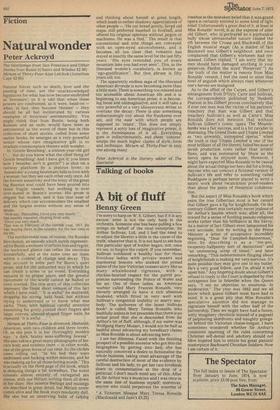Talking of books
A bit of fluff
Benny Green
I'm sorry to harp on W. S. Gilbert, but if it is any excuse, mine is not the only harp in the orchestra. Someone else has been pulling a few strings on behalf of the rival enterprise, Sir Arthur Sullivan, Ltd; and I feel the need tore-adjust the libretto a little in the cause of the truth, whatever that is. It is not hard to see how this particular spot of bother began, nor, once we see, to forgive the culprit. If you remember, Sullivan combined a healthy lust for those frivolous ladies with private means and marmoreal bosoms who stalked the potted palms of the late Victorian conservatory like so many whaleboned tigresses, with a chicken-hearted respect for the putrid proprieties surrounding the Prince of Wales and his set. One of these ladies, an American warbler called Mary Frances Ronalds, very cleverly arranged to have a rich absentee husband, which fitted in very well with Sullivan's congenital inability to marry anybody. The authoress of the latest Sullivan book* is called Mary Teresa Ronalds, who bashfully insists in her preamble that there is no actual proof that she is descended from Sir Arthur's bit Of fluff, although, if my name was Wolfgang Harry Mozart, I would not be half as bashful about advancing my hereditary claims as Miss Ronalds is about advancing hers.
I see her dilemma. Faced with the dazzling prospect of a possible ancestor who got into the biographies by getting into bed, she has naturally conceived a desire to fictionalise the whole business, taking cruel advantage of the careful destruction of most of the evidence by Sullivan and his lady, to get her two lovebirds down to consummation at the drop of a petticoat. I don't much mind any of this. After all, Sir Arthur was a musician and I was once in the same line of business myself; moreover, anyone who could perpetrate the miseries of * A Victorian Masque Mary Teresa Ronalds (Macdonald and Jane's £3.25) Ivanhoe in the mistaken belief that it was grand opera is certainly entitled to some kind of light relief. Unfortunately a great deal of it, at least in Miss Ronalds' novel, is at the expense of poor old Gilbert, who is portrayed as a puritanical bully whose unreasonable nature caused the rift between the Crosse and Blackwell of the English musical stage. (As a matter of fact Blackwell was Gilbert's neighbour, and once complained that Gilbert's workmen had trespassed. Gilbert replied, "I am sorry that my men should have damaged anything in your preserves. Pardon the word 'Preserves'.") As the truth of the matter is remote from Miss Ronalds' version, I feel the need to utter that howl of anguish which always rises whenever one's heroes are maligned.
As to the affair of the Carpet, and Gilbert's estrangement from D'Oyly Carte and Sullivan, the correspondence published by Hesketh Pearson in his Gilbert proves conclusively that if ever one man was the victim of his partners' treachery that man was Gilbert and that treachery Sullivan's as well as Carte's. Miss Ronalds does not mention that without Sullivan Gilbert's comic opera The Mountebanks was a fair success, and is a bit cavalier in dismissing The Grand Duke and Utopia Limited as "two unwieldy, uninspired operas," when the truth is that Utopia Limited is one of the most brilliant of all the libretti, failed because of lavish production costs rather than artistic flaws, and was nominated by Shaw as the Savoy opera he enjoyed most. However, I might have expected Miss Ronalds to be casual about the actual things her hero did for a living. Anyone who can concoct a fictional version of Sullivan's' life and refer to something called Ruddygore is perhaps better placed to write a 'satiric work about recalcitrant proof-readers than about the pains of theatrical collaboration.
But the aspect of Miss Ronalds's book which pains the true Gilbertian ,most is her canard that Gilbert gave a fig for knighthoods. On the contrary Gilbert was certainly never jealous of Sir Arthur's bauble which was, after all, the reward for a series of footling pseudo-religious works rather than his brilliance at the Savoy. As a matter of fact Gilbert even lampooned his own accolade, first by writing to the Prime Minister a letter of acceptance incredibly beginning, "Dear Sir Campbell-Bannerman," then by describing it as a "tin-pot, twopenny-halfpenny sort of distinction" and "an unmeaning scrap of tinsel," and later remarking, "This indeterminate flinging about of knighthoods is making me very nervous. It's quite possible they may give one to my butler. He's a very good fellow, and I'm afraid it will upset him." Any lingering doubt about Gilbert's refusal to toady to the Court is dispelled by that outrageous line in lolanthe when the Queen says, "I see no objection to stoutness. In moderation." The year was 1882 and we all know which queen Gilbert must have had in mind. It is a great pity that Miss Ronalds's speculative ancestor did not manage to ingratiate herself with the other half of the partnership. Then we might have had a funny, witty imaginary chronicle instead of a pageant of palpitating shirtfronts and naughty goingson behind the Victorian chaise-longue. I have sometimes wondered whether Sir Arthur's consistent spurning of the rules concerning Christian self-denial and adultery shOuld not have inspired him to entitle his great pietistie masterpiece Backward Christian Soldiers. Now I am certain of it.


































 Previous page
Previous page